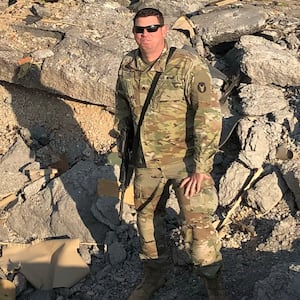In describing Jan. 6, 2021, as “a day of love” at a televised Town Hall on Wednesday, Donald Trump yet again added insult to injury for the 140 police officers who were assaulted at the Capitol that day.
“I saw friends with blood all over their faces. I was slipping in people’s blood,” Caroline Edwards of the Capitol Police testified in May of 2022 before the House Select Committee to Investigate the January 6th Attack.
She went on, “I was catching people as they fell… it was carnage. It was chaos. I can’t even describe what I saw. Never in my wildest dreams did I think that, as a police officer, as a law enforcement officer, I would find myself in the middle of a battle.”
Edwards has not been available for comment. But she provided a detailed account during a pre-hearing interview in April of 2022. She reported that she had handled some 300 “civil disturbance events” during her three years as a police officer.
“Usually, 99.9 percent of the time, we’re just using verbal judo to calm people down, deescalate, move people along, making sure that nothing happens,” she told the committee. “Until January 6th, we had not encountered protesters that would not respond to any deescalation techniques that we used.”
The first sign of what the day would bring came via her Apple watch.
“I remember getting text messages that day from people being like, ‘Be careful, please be safe today.’ And it sounds naive right now, but I had no idea what they were talking about, because our information comes from the Capitol Police about a certain event. Officers try not to go to outside media sources to gather intelligence on any events. It could create a bias. It could create a reaction that you don’t want.”
She went on, “I just remembered being very just confused as to why I was getting so many text messages from people telling me to be careful, and that they were praying for me.”
She began to understand as a large crowd gathered in the Peace Circle in front of the Capitol.
“The general mood was angry, and I’ve worked enough events where I can… tell they’re angry about a situation or they’re starting to get angry at me,” she said. “We heard, ‘animal,’ we heard, ‘You’re Nancy Pelosi’s dogs. Bark for us.’”
She remembered turning to a supervisor who stood with her and a handful of other officers.
“I was like, ‘Sergeant, I think we’re going to need a couple more people down here.’ And, you know, that’s the understatement of the century.”
She added, “I can protect myself, you know, but somebody coming after Congress is a way bigger deal than somebody coming after me.”
She recalled being nervous, “But I still did not in my wildest imagination believe that they were going to try to beat us up in the way that they did. I figured they would tear down some fencing, intimidate us, possibly start tearing down the inauguration stage. That was the extent of my imagination as to how this was going to go.”
There were cries of “this is our house!” as the crowd tore down a fence and advanced on a row of bike racks. Edwards hooked her arms through two of the racks and widened her stance in an effort to create a barrier. Men in the crowd raised the rack up over her head and brought it down, striking her in the temple. She still held onto it.
“They started using the bike rack to kind of push me backwards, and the last thing I remember is going down and my chin hitting the handrail. And then that’s where I fell backwards and the back of my head hit concrete.”
She had a ringing in her ears as she lost consciousness. When she awoke, she was somehow on her feet. She saw that somebody was attacking a fellow officer.
“I remember just kind of trying to will my body, like, ‘Okay, you need to go over there and help.’ But like I was just out.”
She figures that adrenaline kicked in and soon enough, she was back in action, joining the other cops in holding the line against the crowd
“I was just screaming like, ‘Get back. Don’t take one more step. Get back, get back,’ And they were saying stuff like, ‘Make us; this is our house.’”
The crowd hit the cops with construction debris and flag poles.
“With blue line flags,” she noted.
She remembered “just thinking like, is this real life? Like are these people serious? American flags, blue line flags as weapons…to harm police officers.”
She had an internal dialogue that other cops would later tell her they also had.
“[The] dialogue going through your head is, ‘What happens next? What’s their end goal? What are they doing?’ And that was the thought throughout the day. We had no clue that their intention was to, you know, destroy their own symbol of democracy.”
A protester she identified as Ryan Samsel and who would later be convicted of assaulting an officer in the attack, came over and handed her her hat, which must have come off when she was hit in the head.
“He said, ‘I’m the one that picked you up off the ground, remember?’ Of course, I don’t remember. I was knocked unconscious.”
She sensed he was gaslighting her
“It gave me like domestic abuser vibes,” she told the committee. “He was just like very insistent. It was like, ‘Don’t you remember? I’m the one that picked you up. Don’t remember?’”
After two hours of fighting to hold the line on the west side of the Capitol, Edwards and her band moved to the west front. These were different protesters, but the chants were the same, with more, “Bark for me, Nancy Pelosi’s dogs.”
She recalled. “One guy tried to kiss me, which is really gross.”
She sensed movement out of the corner of her eye. She turned and saw Police Officer Brian Sicknick, who would die from the cumulative effects of the attack.
“I could tell he had been sprayed with something, and his face was like white,” she remembered. “It was pale.”
By her experience, the usual reaction to chemical agents was for the face to turn beetroot red.
“So I can remember alarm bells going off. I was like ‘What’s wrong with Sicknick?’ Because if you looked around, everybody was red faced, but he was pale.”
She looked over to see who had sprayed Sicknick.
“That’s when I got a direct hit in the eyes with chemical spray. And it turns out it was the same chemical spray that he got hit with.”
The effect was considerably more intense than the pepper spray cops are exposed to in training, which in her words “is no joke” and “feels like someone just punched two holes in your eye sockets.” She said the effect of the spray was “pain unimaginable.”
“I couldn’t ever open my eyes. So I was stumbling around a little bit.”
A fellow officer helped her around to the middle of the west font, and began to rinse her eyes with water as a line of other cops held back more protesters.
One of them was her husband. He saw her and rushed over. He began to take her toward an entrance to the Capitol .
“That’s when I got hit with tear gas. The combination of the chemicals made my throat immediately close. I couldn’t take a breath at all. That was one of a few times that day where I was like, ‘Yeah, this is probably like where I’m not going to make it.”
But a Hazardous Devices Section officer happened to be there, equipped with oxygen.
“They took off my vest and my gun belt and started giving me oxygen and I came back,” she remembered.
Her husband took her to headquarters.
“But a shots fired call came out over the radio. So we ran back towards the Capitol.”
The emergency passed as they responded. Edwards’ husband helped another cop lock the Senate subway doors while she assisted staffers in evacuating. There were was a report of a breach and she hurried over to see an apparent intruder who was now complaining he had been pepper sprayed and he might be having a heart attack. She had him checked out by D.C. Fire which said he was fine.
“I put him in handcuffs and told him he was under arrest and took him to prisoner processing. I started to notice that I was out of it. I’ve been in prisoner processing I can’t even tell you how many times, but I started asking like where are the computers? And I sat down to put my username and password in, and that’s when I just slumped over, and I woke up in a cold sweat.”
She was transported by ambulance to a nearby hospital. She was diagnosed with traumatic brain injury. She had severe balance issues as well as vertigo, that kept her “off the line” from the department.
“It’s tough,” she said. “You know, that was your identity, that was your whole being, now you’re no longer part of that team, that’s no longer your identity. You go through this intense identity crisis of ‘who am I without the uniform?’ That’s been a struggle.”
But with grit and a lot of physical therapy, she was cleared by the doctors to return to full duty a year and four months after the Jan. 6 attack.
In the intervening months, she has been a member of a peer support group for officers who were injured physically and physiologically in the attack.
“Maybe they shouldn’t let somebody so broken be a part of it,” she said in the congressional interview “But, it’s great to now be able to take all of that and be able to do something good with it.”
One of the committee members told her during the interview that they had several witnesses who said January 6th was not violent. Edwards replied that it was a denial of what she and her fellow officers and their families had been through.
“It’s an insult,” she said.
At another point, a committee member asked how she would be different when she went back to full duty.
“ I would like to say that my trust level has not been affected,” she replied. “But, you know, my trust of people is definitely affected. We used to be a police department that welcomed wholeheartedly 1st Amendment demonstrations, and now every time one comes up, it’s always in the back of your mind–is somebody going to try something?”
She went on, “it’s made for some sadder but wiser officers, you want officers to be able to trust Americans to come up here and let their voice be heard without that manner of distrust, but it’s an impossible ask at this time.”
She said she will remind herself that one of the 300 protests she worked was violent.
“So, you know, I’ll be cautious. But at the same time, I know that the majority of Americans are just here to make their voice heard, and I’m going to keep allowing them to do that with the same grace that I allowed it before, just maybe a little bit less trust.”
She is sure to stick to that even if the next president inaugurated has called Jan. 6 “a day of love.” She is also sure to defend the Capitol if he loses and some of his followers refuse to go along with a peaceful transfer of power.
And, the Daily Beast had learned, she had been promoted. She will be doing so as Sergeant Caroline Edwards.







